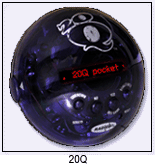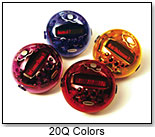| A Web site had never before been turned into a game. |
What’s smaller than a pack of cards, smarter than a bug and one of the fastest selling toys out there? If you answered 20Q in less than 20 questions, you win! 20Q is a smart toy that almost reads a player’s mind. Think a question, and 20Q answers it. And the companies that carry 20Q are even smarter.
In the Beginning….
Founded by Robin Burgener, 20Q.net’s story starts back in 1988, when Burgener was a computer programmer with time on his hands. He created a question-answering neural-network — basically, a program that learns as it goes, similar to a human brain. Using the old Twenty Questions format (“Animal? Vegetable? Mineral?”), he came up with the prototype for 20Q. But it was small and not too bright. “Me and a few friends would play it, and that was it,”  remembers Burgener.
remembers Burgener.
Enter the Internet
In the mid-‘90s, Burgener decided to put the game on the Web. “Suddenly, instead of three people playing it a couple times a week, it was a hundred people playing it every day.” Each time someone played it, it learned.
In 1998, Yahoo named 20Q.net its Site of the Week, and suddenly hits went through the roof. “I went from a DSL line in the back room on a small computer, to fiber optics and a bank of top-of-the-line hardware. It’s still in my back room, though,” Burgener jokes.
Enter Radica 
Radica Games Ltd., a NASDAQ-traded electronics company around since 1983, approached Burgener to make 20Q into a handheld game. A Web site had never before been turned into a game.
“I had to do some major rethinking and compression algorithms,” Burgener explains. “Right now, the handheld is about the level of an insect intelligence. That’s pretty good,” meaning it gets the right answer almost 50% of the time.
Burgener remembers when Radica first debuted it. “There were two distinct reactions, the quizzical ‘Huh?’ or, they picked it up, played with it, and ordered a bunch.” A bunch equals over 50,000 units a week in North America alone.
Kelly Cullin of Toys “R” Us says it’s one of the fastest selling items they stock. “It’s non-gender biased, hits on the school level—a lot of teachers bring it into class and then every kid wants it. Adults are buying it, too,” she says. “And at $10, it’s a great price-point.”
With a comparable price-point to the larger chains, smaller sellers find 20Q’s sell easily as impulse buys. Stores in England already carry it, too.
So What’s Next?
“We’re starting the process of putting it into other languages, which is not so easy,” explains Burgener. “There are all sorts of cultural and contextual things that pop up. First, we do the basic translation, then we put it up on the Web and wait for it to get smarter. Then, when it’s smart enough, we’ll take the program and stuff it into a handheld.” So far, the Germans like to play it in English as well as German.
And the Carrot?
The #1 question, asked about 1 percent of the time of 20Q is … “Is it a carrot?” “You know,” a bemused Burgener thinks, “Maybe I should just have the game ask “Is it a carrot?” right off the bat. One out of a hundred it would be right … and wouldn’t that freak people out?”

